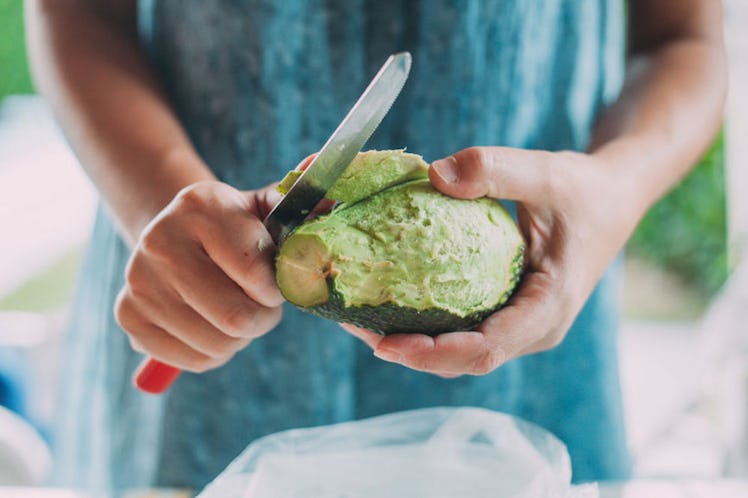
There's A Listeria Scare In Avocados Now, But Here's Why You Shouldn't Panic
I genuinely believe I could fit avocado into any dish. I've made chocolate mousse from avocado; I've used it to make a cake taste more rich; I've blended it into homemade hummus; and, of course, I've enjoyed it on tacos almost every day of my life. I can't count the number of times I've bonded with friends over a communal bowl of perfectly seasoned guac. But even a self-proclaimed avo expert like myself is still wondering: Do you need to wash avocados before eating them? A recent Listeria scare in the green fruit should prompt you to be a little more careful when enjoying the tasty produce. But while this news is definitely the pits (see what I did there?), there's no need to panic, friend.
According to a new report issued by the FDA, a percentage of avocados have tested positive for Listeria. But before you get too worried and wave goodbye to your avo toast obsession, here's what contracting Listeria actually looks like: People who are pregnant, older, or have weakened immune systems have a higher chance of Listeria food poisoning, according to the Centers for Disease Control and Prevention (CDC), but those who don't fall into any of those categories can also develop symptoms one to four weeks after eating food contaminated with the foodborne germ. While symptoms can vary from person to person, food poisoning signs like fever and diarrhea could point to the sickness, as per the CDC.
During the avocado analysis, the FDA collected 1,615 samples of avocados to undergo testing, as per the agency's report. While only 0.74 percent of the samples were contaminated with salmonella, and only 0.24 percent of the avocado flesh contained traces of Listeria, a hidden culprit presented much higher contamination rates. Although the avocado flesh was found to be relatively harmless in terms of its contamination levels, the FDA's report found a full 17.73 percent of the avocado skins showed signs of Listeria.
I'm willing to bet you aren't in the habit of eating the avocado skins along with the creamy insides, but that doesn't mean snacking on an avo that has a potential Listeria contamination in the skin isn't a risk. Listeria germs can spread through contact, so even cutting open the fruit to get to the green goodness inside could spread dangerous microbes from your knife to your hands, or even to the sliced flesh.
No need to abandon your guac dependency completely, though, because a little extra preparation can help to reduce possible contamination risks. “Wash all produce thoroughly under running water before eating, cutting or cooking," suggests Foodsafety.gov. Even if you plan on throwing your avocado skins away as soon as you remove them, it's still important to wash the whole fruit so that any potential contamination goes down the drain instead of onto any surfaces you may touch or eat. Scrubbing down your avos with a firm brush is also a great way to get them squeaky clean, recommends Foodsafety.org.
Unfortunately, buying your avocados from a local market won't necessarily prevent you from receiving contaminated produce. The FDA tested both nationally grown and internationally grown avocados in its analysis, and both sources tested positive for contamination. Of the 64 positive avocado skin samples, 33 were from domestic avocados, and 31 were from imported avocados, as per the FDA's report. So your best bet for staying healthy is to give the little guys a good wash, and then snack away.